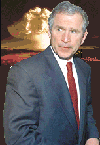









Bush favors sacrificing our military Personnel
Do I have this right?
George Bush is in an interesting position in the debates. Basically, all he has to do is show up and make coherent statements and he exceeds people's expectations. Bush did show up, and because he was able to name a number of hot spots around the world, the press and Republicans are saying that he has a firm enough grasp on foreign policy to be President.
Let's take a look at one aspect of this. When Jim Lehrer of PBS asked both candidates which of the recent US interventions abroad they supported, two of the answers given by Mr. Bush really caught my attention.
The first was his statement that he did not support our intervention in Haiti, this in conjunction with his repeated statements that it was most important for us to take action within our own hemisphere. What hemisphere does Bush believe that Haiti is in? Does he not believe that the intervention was for a worthwhile cause, or that no significant changes ensued? As a veteran of numerous AMIO/HMIO (Alien/Haitian Migrant Interdiction Operations) I know for a fact that the actions that the United States took were justified, and that they have introduced profound changes in Haiti. Mr. Bush also states that the United States military is severely overextended, and cites Haiti as one example. There are twenty-four military personnel assigned to Haiti. I don't know where Mr. Bush gets his numbers, but twenty-four service members wouldn't even seriously overextend the U.S. Coast Guard - as small and as heavily overtaxed with missions as it is, much less the entire U.S. military.
More significantly, Mr. Bush claimed that he support(s/ed) our intervention in Lebanon. I have to wonder just what it was about it that he supported. Was it the fact that President Reagan, just like Governor Bush, is not "a detail man" and allowed his foreign policy decisions to be made by other people? In this case, "other people" would include George Shultz, who is currently Mr. Bush's chief foreign policy advisor, and at the time of our intervention was Secretary of State in the Reagan administration - the man who orchestrated our unprepared involvement following the the Phalangist massacre of more than 3,000 men, women and children at Sabra and Shatila. Israel supported the Phalangists, the United States supported Israel, and the United States acted out of guilt. Mr. Bush doesn't believe in nation building, but that is exactly what our intervention in Lebanon was. Did Mr. Bush like the nation building part where the United states trained the Lebanese Army, and gave the world our policy in relation to Lebanon with the help of massive military power, which included the shelling of Syrian troops by the US battleship New Jersey? Did Mr. Bush like the part where, because Shultz had forced a one-sided Israeli security agreement, no one took the United States seriously as an even-handed broker - that the agreement was never put in place, and instead, Syria ended up dominating Lebanon? Did Mr. Bush like the part where, because of all these things, the US was looked on as just another faction in the civil war in Lebanon? Did Mr. Bush like the part where we lost 241 US military personnel in the Marine Corps barracks suicide bombing because we were so unprepared and obviously partisan? Is this the type of situation that Mr. Bush is going to get the United States into by relying wholly on the advice of his foreign policy advisors, who may or may not be familiar with the implications and ramifications of our involvement in a particular area?
Anyone planning on replying to crises of this nature by using insignificant little clichés, military power, and an aversion to familiarity with details is setting us up for another Lebanon, and apparently can't see anything wrong with that. Such a person should be kept as far away from 1600 Pennsylvania Avenue as possible.
Terry Ross, 17 October, 2000
[ TOP ][ FEAR BUSH ][ ALIBOOM ] Back to Other Points .

